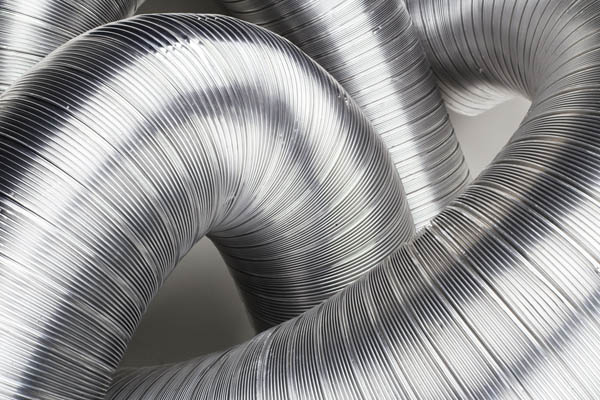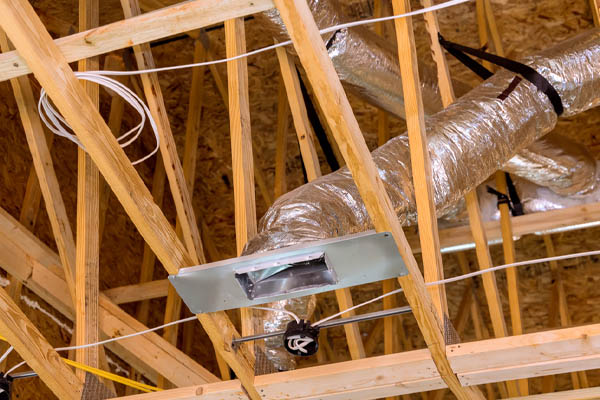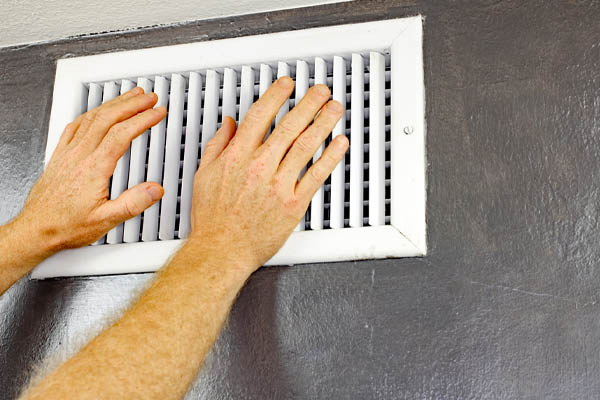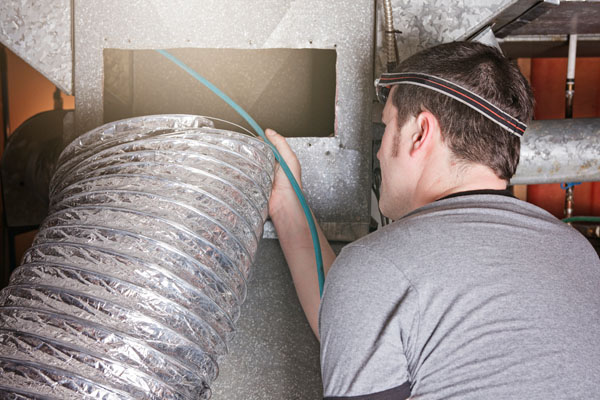The Importance Of HVAC Ductwork Design

HVAC ducts are crucial in maintaining indoor comfort. This article discusses why ductwork is essential as it intricately links heating and cooling components to deliver conditioned air throughout your home or office. Ductwork design is vital in ensuring the HVAC system operates optimally. From circulating airflow to maintaining consistent temperatures, well-designed ductwork is the foundation of an energy-efficient and comfortable home. Keep reading to learn more.
Related Article: Signs You Need Better Air Quality At Home
Understanding Heating & Cooling Ductwork Design
Contents

Ductwork design includes planning and creating a pathway system where heated or cooled air can travel for distribution throughout the structure. It includes identifying the ducts’ materials, layout, and size.
Correct sizing and ductwork layout are essential for efficient air circulation. Improper sizing can cause inadequate airflow or energy waste. Optimal layout ensures the temperature is evenly distributed and pressure drops are reduced. This improves the overall system performance.
Ductwork materials affect its performance. Ductwork can be made of several materials, and the most commonly used ones are flexible ducts and sheet metal ducts. Flexible ducts are versatile and easy to install but may cause air leaks. Sheet metal ducts are durable and leak-resistant but need careful design and sealing.
Ensure you select the most suitable material for your home to achieve balanced durability, efficiency, and cost-effectiveness in HVAC systems.
Related Article: Key Differences Between HEPA & MERV Filters
HVAC Ductwork: Energy Efficiency & Cost Savings
Ductwork design is a crucial factor in energy efficiency. Properly designed ducts ensure balanced airflow, reducing energy loss from leaks or insufficient insulation.
A well-designed duct ensures that the conditioned air reaches its intended destinations efficiently, reducing energy costs. Enhanced energy usage also contributes to minimizing your total operating expenses.
A properly sealed and insulated ductwork helps prevent air leaks, enhance energy efficiency, and increase home comfort and savings. Other benefits include reduced heat transfer, consistent indoor temperatures, and higher overall HVAC performance.
Related Article: Why Is Condensation On Air Ducts A Cause For Concern?
Proper HVAC Airflow & Comfort

Ductwork design is most important in achieving balanced airflow. This means that conditioned air is evenly distributed throughout the entire building. The design ensures consistent temperatures and prevents overworking your system.
An adequately designed ductwork ensures there are no cold and hot spots within the structure. Even circulation of conditioned air ensures all areas are comfortable, improving occupant comfort and satisfaction.
Effective duct design can also efficiently filter and distribute air, improving indoor air quality. Well-designed ducts keep dust and pollutant buildups, enhancing your family’s comfort and well-being. You achieve physical comfort and good indoor air quality when you prioritize having well-designed ducts.
Related Article: How HVAC Comfort Zones Cut Energy Costs
Noise Reduction & HVAC Performance
Ductwork design affects the noise level your HVAC system emits. This can have adverse effects on your home’s comfort and tranquility.
- Airflow Restrictions and Noise: Poorly designed ducts with improper sizing, sharp turns, and excessive bends can restrict airflow. The air passing through constricted ducts produces turbulent airflow and louder noise. Ensure your ducts are properly designed so they have smooth transitions and gradual bends that minimize airflow disruptions and lower noise.
- Noise Transmission: Insufficient duct insulation or seals can transmit noise from your HVAC unit to the rooms in your home. Vibrations and mechanical noises from your system can travel through the vents and generate unwanted noises in different areas. Adequate insulation and sealing dampen vibrations and keep noise transmission at bay.
- Duct Material and Thickness: The duct material can affect noise levels. Some materials, such as sheet metal, aren’t equipped with sound-absorbing properties that reduce noise. Thicker duct walls help insulate noise better than those made of thinner materials.
- Duct Placement and Distance: Careful duct placement helps keep noise from getting inside sensitive areas. Ducts running through bedrooms and offices must be strategically routed to lower noise disturbances. Increased distance between the HVAC unit and occupied rooms also helps reduce noise problems.
- Acoustic Considerations: Ductwork design can include acoustic features to help minimize noise. Examples include using baffles and silencers to lessen noise propagation or adding sound-absorbing materials in the ducts.
Reducing HVAC system noise creates a tranquil environment and improves the unit’s efficiency. Excessive noise can create stress, discomfort, and health issues for the occupants. A quiet system means it functions properly and runs optimally.
Ductwork design directly affects the HVAC unit’s performance. Improperly designed ducts can result in airflow restrictions, making the system work harder to maintain the set temperatures. This increases energy use and reduces system efficiency. It also creates unwanted wear and tear on the system’s components.
Related Article: Tips on How to Protect Your HVAC Warranty
Addressing Common Heating & Cooling Ductwork Issues

Ductwork problems can have severe consequences on HVAC systems. Some of the common issues include:
- Leaks: This results in lower efficiency, energy waste, and uneven temperatures.
- Poor insulation: This problem causes heat gain or loss that can compromise your indoor comfort.
- Incorrect-sized ducts: This can cause insufficient airflow. It can also put a strain on your HVAC system.
Effective Strategies to Improve Heating & AC Ductwork
Several effective ways to improve HVAC ducts include adding insulation, sealing ducts, and resizing the ducts to match the system. You can also try incorporating smooth transitions, gradual bends, and even circulation.
Professional ductwork checkups and repairs are vital. HVAC experts can determine hidden issues, check the system’s overall performance, and recommend solutions. Regular tune-ups and prompt repairs ensure efficient and problem-free ducts, contributing to your HVAC system’s optimal performance and longevity.
Related Article: Seek A Second Opinion Before Replacing Your HVAC System
Considerations for New Installations and Upgrades

If you are constructing a new house or office, the building layout, HVAC load, and room sizes are crucial in ductwork design. Correct sizing, choosing the material, and duct layout are also vital in ensuring even airflow circulation and efficient cooling or heating.
If you are upgrading your current ductwork, you should first assess the current performance and determine the areas that need improvement. Upgrades may include sealing leaks, adding insulation, or resizing ducts to improve comfort and efficiency.
HVAC professionals can assist you in determining the ductwork design that will work optimally for you. They will examine your specific needs and calculate load requirements. They can also recommend design upgrades or adjustments that best fit your building’s unique characteristics. Professional HVAC experts ensure that the new installations or upgrades can deliver effective HVAC performance and are in line with energy efficiency standards.
Related Article: The Importance Of Home Air Sealing Your Home On Energy Costs
Conclusion
Well-designed ducts affect energy efficiency, comfort, system longevity, and noise levels. Determining the right layout, proper sizing, and most suitable duct material is crucial to ensure a harmonious indoor space. Prioritizing professional ductwork design assures homeowners that their HVAC systems have optimal operation, promoting efficiency, comfort, and the occupants’ and the environment’s well-being.
Related Article: 7 Must-Have Accessories to Improve HVAC Performance
Call Point Bay Fuel For All Your HVAC Requirements

Point Bay Fuel is the leading HVAC service provider in Ocean County and Monmouth County, New Jersey. Our highly skilled and professionally certified technicians are experts in heating and cooling installations, replacements, repairs, and maintenance. We proudly deliver excellent services to all our customers.
Our company understands that having a comfortable and energy-efficient home is of utmost importance. This is why we provide affordable pricing for our services. Our tune-up services can aid in enhancing home comfort and reducing energy expenses. Our experienced and knowledgeable techs can recommend the best solution for your HVAC repair or replacement needs while keeping your budget in mind. We offer a satisfaction guarantee on all our work.
Point Bay Fuel offers free, in-home estimates so you can make informed decisions regarding your HVAC systems. Schedule a service appointment with us by calling us today. Rest assured, we provide superior heating and cooling services that will exceed your expectations!
Contact us now by calling (732) 349-5059 to speak to one of our home comfort specialists! Click the link to view our service area.
